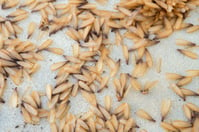We're seeing a sudden climb in temperatures this week, followed by some rain - and when temperatures and moisture increase, so does pest pressure. Read on to learn why many pests like ants, ticks, mosquitoes, and termites thrive in these conditions.
 Warm weather allows plants to bloom, providing essential nutrients for a number of insects, including ants. A plentiful source of protein and carbohydrates means ants can rapidly expand their colonies, which often lands them at our doorsteps - and once they're in our homes, ants aren't picky eaters.
Warm weather allows plants to bloom, providing essential nutrients for a number of insects, including ants. A plentiful source of protein and carbohydrates means ants can rapidly expand their colonies, which often lands them at our doorsteps - and once they're in our homes, ants aren't picky eaters.
The combination of heat and moisture also makes perfect conditions for ticks, mosquitoes, and termites. To prevent their bodies from drying out, ticks must ingest water, but they don't drink like we do - they absorb it from the atmosphere. When there's plenty of water vapor in the air, ticks can seek out hosts for longer periods of time. (Learn how to avoid becoming a host here!)
Mosquitoes breed in shallow pools of standing water, such as puddles, ponds, damp piles of leaves, and even bird baths. A female mosquito needs only a thimble's worth of water in which to lay her hundreds of eggs, so be sure to remove sources of standing water around your property.
 Termite swarming typically occurs during warm days following a period of rain - and this could be the only time of year to know if you have a termite problem. Considering that termites are responsible for an estimated $5 billion of damage each year, it's worth taking a few minutes to learn the signs of a termite infestation in your home, and calling a professional if you suspect a problem.
Termite swarming typically occurs during warm days following a period of rain - and this could be the only time of year to know if you have a termite problem. Considering that termites are responsible for an estimated $5 billion of damage each year, it's worth taking a few minutes to learn the signs of a termite infestation in your home, and calling a professional if you suspect a problem.
Like humans, many pests will avoid the heat and damp by adjusting their activity; some may lay low during the day and become more active in the evenings, while some will seek shelter in our homes where it's cooler.
Whether it's in the coming weeks, later this spring and summer, or even the dead of winter, the Burgess Pest team is here when you need us - in the meantime, grab your copy of our free 2023 Spring Pest Guidebook for tips and information on staying pest-free this season!


